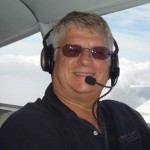
by bob pastusek
Although our LOBO-certified instructors specifically don't share names of individuals/aircraft involved, they do discuss with the LOBO Council the deficiencies they observe. Jeff Edwards and our other instructors review operational deficiencies during every LOBO Ground School we conduct, and Jeff presents common pilot/crew errors during the safety briefings integral to every LOBO function. What we've apparently not emphasized enough is the requirement to bring an airworthy airplane to training.
fThis is an appeal to keep your Lancair in tip-top repair/operating condition. You'll enjoy flying it more, and it will be much less likely to let you down when you need it to perform... And you will need it to perform to its design capabilities during initial and re-qualification training.  A frequently reported aircraft deficiency is inoperative instrumentation. This includes everything from cabin pressurization and fuel gauges to inoperative attitude and heading systems. While a cabin pressure gauge may not be specifically required for LOBO training, the attitude and heading systems are essential for effective training, and required for your aircraft to be legally airworthy. Most of us have redundant/multiple instrumentation systems, but if normal operations include "flying on the standbys" you are defeating the whole point of having them. LOBO training involves realistic scenarios, and should be as close to real-world operations as practicable. This just isn’t possible if the equipment you need is inoperative.
A frequently reported aircraft deficiency is inoperative instrumentation. This includes everything from cabin pressurization and fuel gauges to inoperative attitude and heading systems. While a cabin pressure gauge may not be specifically required for LOBO training, the attitude and heading systems are essential for effective training, and required for your aircraft to be legally airworthy. Most of us have redundant/multiple instrumentation systems, but if normal operations include "flying on the standbys" you are defeating the whole point of having them. LOBO training involves realistic scenarios, and should be as close to real-world operations as practicable. This just isn’t possible if the equipment you need is inoperative.
Airframe deficiencies are usually more problematic, especially if there is a question of airworthiness. While LOBO requires that you to act as Pilot in Command (PIC) during flight instruction if you are qualified to do so, the FAA has a record of looking at any accident survivors as potentially liable/at fault if they were serving in an instructor/training capacity (and in some cases even when they were not). So please don't ask our instructors to ignore inoperative fuel gauges or leaking oil—it's their ticket, your safety and the safety of your aircraft on the line.
For questions/comments contact Bob via email: r.pastusek [at] lancairowners.com.